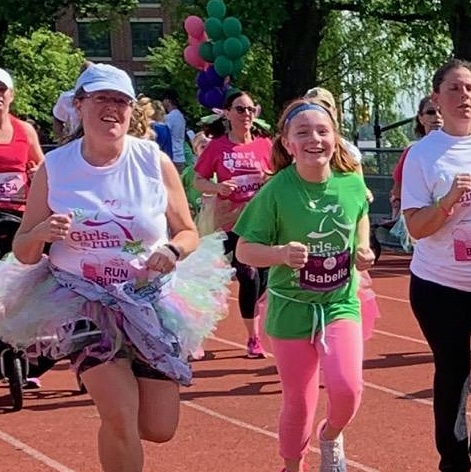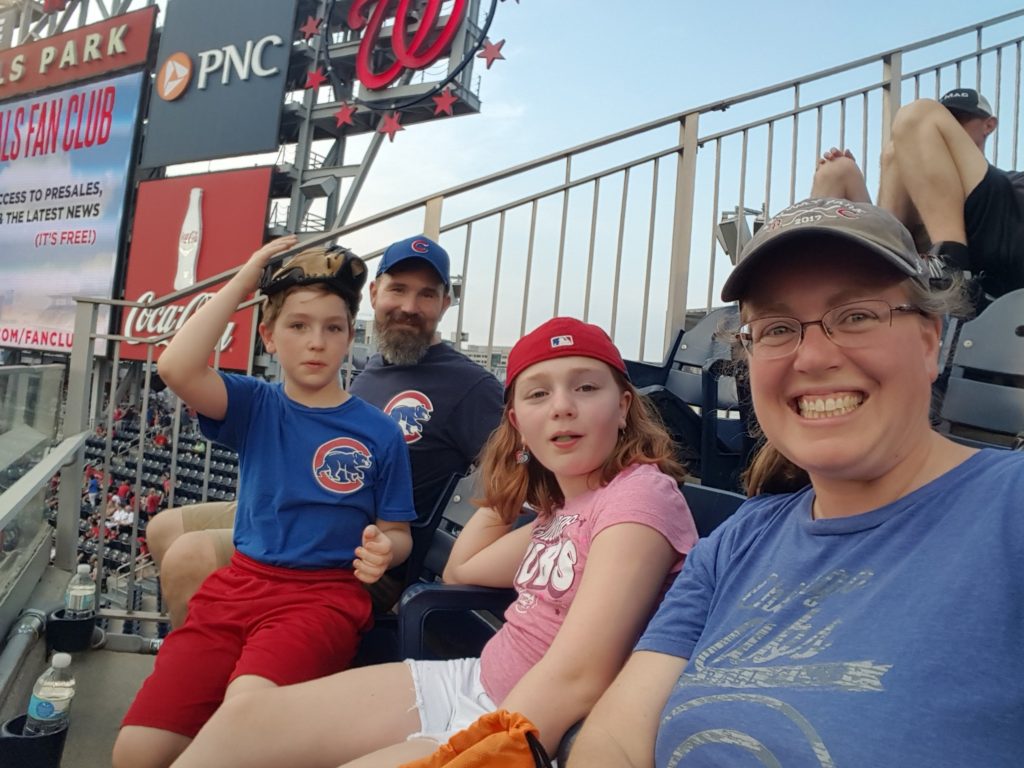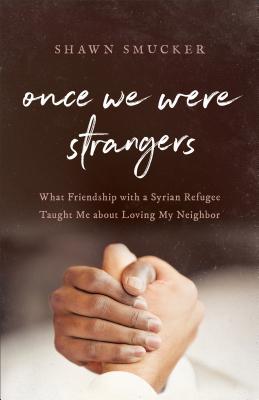“Good job, Isabelle! You’ve got this!”
We were on the track, running the last stretch of our 5K for Girls on the Run. I looked at the face of the woman cheering my daughter on. I didn’t recognize her.
“Do you know her?” I asked. Isabelle shook her head “no.”
“Then, how does she know your name?”
As soon as I asked the question, I had the answer. This year, the girls’ race bibs had their names on them, and strangers were cheering them on by name.

We made our final push to cross the finish line and joined the crush of people waiting for water, bananas, chocolate milk and cupcakes. Humidity was at 100 percent, and our bodies were feeling the effects. My daughter’s face was splotchy red, and I was starting to feel a little lightheaded. Neither of us was puking, which could not be said for other finishers of this race.
After we grabbed our post-race treats, we made our way back to the spot where everyone from our team met up, reconnecting with my son and our friend Carol who has cheerfully been our support team for three years. We stood at the edge of the track cheering on other runners as they finished. I only called two names specifically, and they were both people I knew, but every time a name was shouted, you could see the runner perk up a little, as if it was just the boost she needed to finish strong.
One thing that leaves an impression on me from Girls on the Run is how inclusive and welcoming it is. Maybe it’s the T-shirts that identify everyone as belonging to this massive event or the commitment of showing up at 8 a.m. on a Saturday, but I always feel like I’m part of something bigger when I’m there. And I’m inspired by the people who come to the event, seemingly just to encourage others. I mean, why else would someone wear a full body Iron Man costume with a tutu and run through the crowd slapping high-fives? (I aspire to be that cool someday.)
Cheering on strangers, even calling them by name, it’s the kind of world I want to be part of.
—
Later that same day, we drove toward Washington, D.C. to see a baseball game. Our beloved Cubs were in town, and we were going to try again to cross Nationals Stadium off our list of baseball parks we’d visited. The four of us were decked out in Cubs T-shirts and hats. We boarded the train in Maryland and made an instant friend who was also wearing a Cubs shirt.
“Go Cubs!” he said. My husband responded with the same words. The man was sitting next to a guy in a Nationals jersey. He told us we needed to get on the train going the other way. (Spoiler alert, this train was the end of the line and only went toward the city.)
As we neared D.C., the train continued to pick up passengers who were wearing Cubs clothing. At one point, when personal space was limited, my son made a friend. A woman who could have been his grandmother started asking him questions about his favorite player and what he thought about tonight’s game. There were so many Cubs’ fans on the train, I almost forgot for a moment that we weren’t in Chicago. The experience reminded my husband and me of the time we took the train to see the Cubs in Chicago and the cars were packed from side to side with Cubs’ fans the closer we got to Wrigley Field.

We made our way to the ballpark and to our seats, where our visiting team clothing sparked conversation. A family behind us was from Kansas City, or they were Royals’ fans at least. They wanted to know if we were from Chicago. After the first inning, a family of Cubs’ fans sat next to us and the dad was super talkative. He wanted to know where we were from and told us all about the travel itinerary that had gotten them to the game that day.
I don’t always like talking to strangers, but there’s a camaraderie among Cubs fans, especially when we’re in a city other than Chicago. It had been a long day, and my allergies were bothering me, and it was going to be late before we got back to our house, but I didn’t want to be anywhere else.
It might sound silly, but wherever the Cubs are feels like home to me. They’re a link to where we grew up. It’s a part of our childhood that we can share with our kids. And the players are familiar to us because we listen to games throughout the week and watch highlights the day after games when we can. Even when we’re visiting a ballpark other than Wrigley, I feel like I belong there. (And it’s been a long time since I’ve been to Wrigley, but it will feel like coming home the next time I’m able to go. My kids get to go this summer. Yep, I’m a little jealous.)
Maybe it’s the T-shirts, or the history that offer that same sense of connection. If I know you’re a Cubs fan, I know you’ve probably faced disappointment. Maybe decades of it. Even if you’re a new fan because of the World Series win, I know that you’ve chosen to cheer on a team I love, maybe regardless of location.
As transplants from Illinois to Pennsylvania, we sometimes feel like oddities. Not too long ago, someone who didn’t know our background asked us why we were Cubs fans and not Phillies fans. We walk through our daily lives wearing our team’s apparel, which gets an occasional second look, but the closer we get to a baseball stadium, the more of “our people” we find. Those of us who have been cheering on our team in our own homes or as the lone fan in the bar join a welcoming crowd. Suddenly, we feel less alone.
—
A couple of weeks earlier, I attended a community breakfast before work. An author friend was the guest speaker and the organization is one that is near to my heart. For years I volunteered with Church World Service helping with refugee resettlement, and then 18 months ago I got a part-time job that consumed my weekdays and my opportunities to volunteer dwindled. I still care deeply about refugees and immigrants, and I’ve done other things to support the organization.
But the truth is I miss the people. All of them. The newly arriving refugees walking through the city to learn about their new home, the ladies gathering every other week in a stuffy second-floor gym in a church, the paid employees who work tirelessly (and beyond their meager pay) on behalf of people who need assistance and advocacy.
I was a little nervous to be rejoining the group for a free breakfast. I didn’t feel like I had earned the right to be there. But I learned another lesson in welcome that morning. It’s not something that’s earned. Welcome is given freely and generously, and I left the breakfast full in spirit, having shed some tears.

Two of the CWS employees, women I worked closely with, greeted me enthusiastically with smiles and hugs, wanting to know all about how my family was doing and what I’d been up to. One of them extended an invitation to rejoin the women’s group I’d been part of, anytime I had free time. Others waved “hello” and my author friend chatted with me for a bit.
I was particularly moved by the words of one of the CWS staff, who said she has learned from refugees and immigrants that “Hospitality is so much broader than I thought. It’s being willing to be welcomed into someone else’s home as much as it is welcoming someone into your home.”
I always think I have this huge responsibility to provide welcome through my home. Sometimes, it’s the opposite. It’s being willing to be received into someone else’s home–or life–even if you don’t think you’ve earned the right or deserve it.
—
Reconnecting with Church World Service reminded me of the opportunities I still have to welcome people into the community. Refugee arrivals have dwindled but not stopped completely. Cross-cultural friendship is different from the kinds of friendship I usually seek, but if I’m learning anything about this practice–call it welcome or hospitality or something else–it’s that we have to start somewhere, and it’s not as complicated as I make it out to be.
It’s easier to seek out those with whom we have some obvious things in common, like the schools where our kids attend or the sports they play or the neighborhood we live in, but we can still provide welcome even if we have to look a little harder. I often remind myself to start with our shared humanity if that’s all I can come up with. (Spoiler alert: that’s more than enough as a place to begin).
I don’t always like to admit it that I have a circle drawn around the people with whom I’m most comfortable, and I’m not always willing to widen that circle and let someone in who I’m less comfortable with. But that’s our challenge if we want be people of welcome: We find ways to open the circle a little wider.

I love this sentiment from Glennon Doyle:
Also: horseshoes are better than circles. Leave space. Always leave space. Horseshoes of friends > than circles of friends. Life can be lonely. Stand In horseshoes. https://t.co/RzNxksag0S pic.twitter.com/w6EyvDF0pj— Glennon Doyle (@GlennonDoyle) June 5, 2018
Sarah Quezada in her book “Love Undocumented” reminds me that how I do this isn’t as important as the actual doing it.
“The point of bighearted hospitality is not the act itself,” she writes. “No, the point of bighearted hospitality is to demonstrate our love for God by showing love to strangers. The specific action stems from the needs at our doorstep and a willingness to open our hands and offer everything to the version of God right in front of us. The stranger in our midst.”
—
I have been shown welcome in so many ways. How will I pass on the welcome? How will you?
I’d love to hear about a time when you felt welcome or like you belonged. Feel free to share in the comments.
